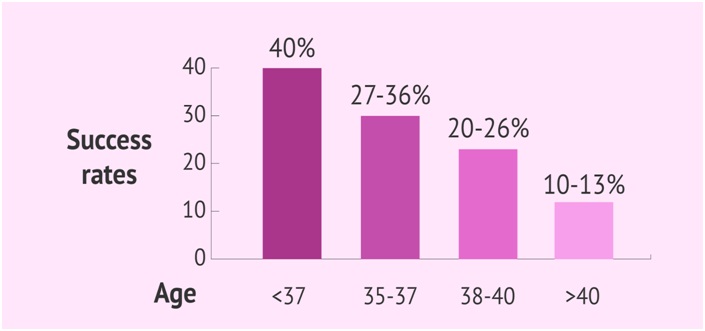What Are IVF Success Rates By Age And Number Of Embryos?

In today’s world, IVF is a household term. In vitro fertilisation or IVF is a type of ART (assisted reproductive technology and hope for couples with fertility problems. It helps you have a baby, whether you are a married couple, a single parent, or a couple of the same gender/sex. You opt for IVF treatment when you don’t become parents naturally. Before you make a move for IVF treatment, many of you look for an ideal maternity centre, IVF clinic, or hospital with a higher IVF success rate. Some of you look for overall success rate while some look for IVF success rates by age and embryo numbers. Keep reading the post to know it in brief.
IVF Success rates by age
A female’s age plays a crucial role in the success of IVF treatment. According to AIIMS Delhi, the overall IVF success rate lies between 30% and 35%. However, it differs from one female to another and is different in different age groups. It is higher in the 20s and early 30s and starts decreasing in females above 35.
IVF success rates under 35 – In their 20s, females are more fertile. And hence, the success rate of IVF treatment is higher. In your 20s, you will have a 20% of pregnancy success if you have no fertility issues. If you opt for IVF treatment due to any infertility issues such as lower egg numbers, genetic disease, etc., your IVF success rates will be different. As per the Centre for Disease Control (CDC), the success rates would be:
- Higher if you are under 35
- 32% if you are under 35 and haven’t conceived before
- 37% if you have had a child and are under 35 and trying to have the second child through ART
- 34% if you have more than two children and are in your 20s
IVF success rates above 40
Usually, females above 40 have a lower chance of being pregnant naturally. It is, as women start having menopause after 35. However, ART is a ray of hope for women in their early 40s and can make them have a child before hitting menopause. As per the CDC, you would have:
- 20% chances of having successful IVF treatment and only 14% chances of having live birth if you are 40 years old
- 14% chances of IVF treatment success and 10% for live birth if you are 41-year-old
- 3% chances of having a successful IVF treatment and 1% chance for live birth if you are or above 45
IVF Success rates by number of embryos
Apart from age, the number of embryos is a crucial factor affecting IVF success for couples willing to be parents. Before transferring the embryos into a female’s uterus, the doctor uses the pre-implantation diagnosis (PGD) technique to determine, differentiate, and choose the right embryos. Many experts state that there are minor differences in the IVF success rates whether they opt for single or multiple embryo transfer. Having a close look at the data as per the studies done till now will help you know that there is only a 3 per cent gap in the success ratio. Here is the slight difference in IVF success rates by the number of embryos:
- The success rate of IVF treatment with a single embryo transfer is 45%
- It comes down to 42% on double embryo transfer
Conclusion
The success rate of IVF treatment depends on several different factors such as age, number of eggs/embryos, donor sperm, and patient’s health condition. The above-mentioned IVF success rates are based on research data and may not be applicable to you. Your doctor will state whether going for an IVF treatment is good for you or not after interacting with you and going through some test results. It means you should value what your gynaecologist instructs you.